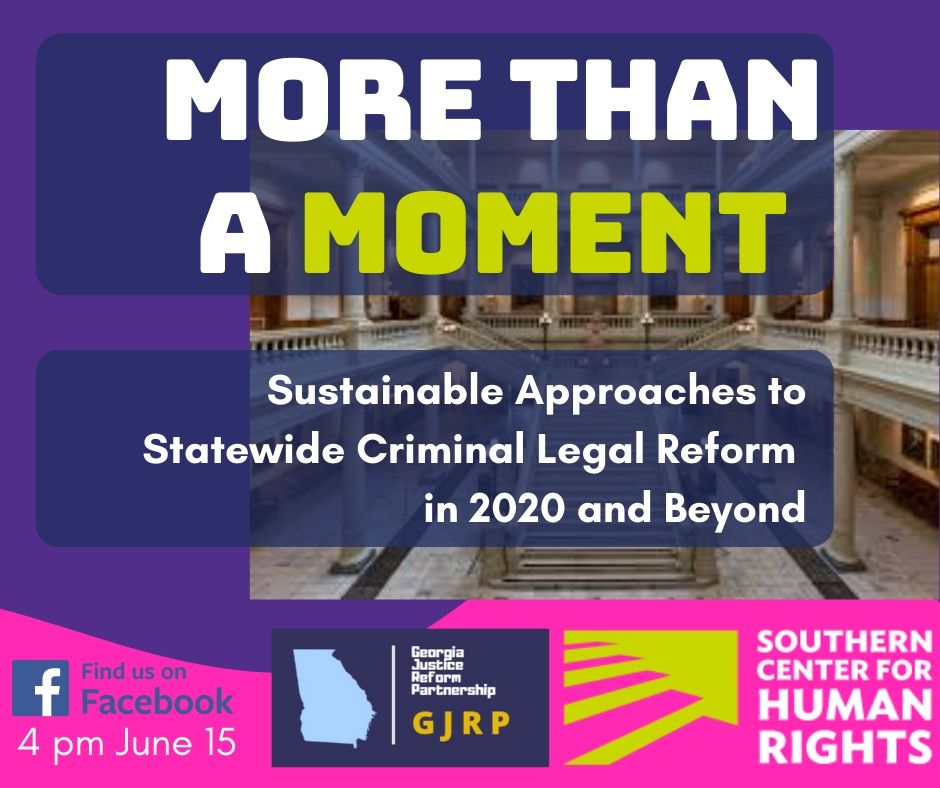Georgia Legislative Session Resumes Monday, June 15th, 2020
On March 12, 2020, Georgia’s Legislative Leadership indefinitely suspended the 2019-2020 Legislative Session due to concerns about COVID-19. However, SCHR’s fight for positive state-level policy change in Georgia’s criminal legal systems did not end there. Our Public Policy Unit and Communications team have been working hard to prepare for committee hearings, which resumed Tuesday, June 2nd and for the Legislative Session, which resumes on Monday June 15th. All the bills that passed by Crossover Day — the deadline for bills to pass at least one chamber of the Georgia General Assembly — are still eligible for consideration.
In addition to moving legislation, lawmakers must also grapple with steep budget cuts to state agencies. Before the economic downturn caused by the Covid-19 pandemic, Governor Kemp mandated a painful 6% cut to all state agencies’ FY 2021 budgets. Now, agencies are expected to contend with a 11% budget cut.
Criminal justice agencies have presented proposals to budget writers that included troubling furloughs, facility closures, and scaled back services. Cuts to Georgia’s accountability courts and alternative sentencing programs may mean the closure of between 8 and 12 courts, which could result in more than 1,900 people ending up in local prisons and jails instead of receiving appropriate mental health treatment.
The Georgia Public Defender Council — which already operates with meager financial resources — may struggle to adequately provide constitutionally-required representation to people accused of crimes if cuts to the agency move ahead as proposed. We fear that these changes, in addition to the Georgia Department of Correction’s proposal to close 6 state facilities in order to cut costs, may further inundate Georgia’s already overwhelmed criminal justice system.
It is imperative that lawmakers hear from people impacted by the criminal legal systems in Georgia on the budget and issues that matter most. Due to Covid-19, most legislative hearings will be livestreamed — you can find Georgia House committee hearings streamed here, and Senate committee hearings streamed here. We will continue to provide updates about how you can be involved through virtual advocacy on our website, social media, and direct calls to action.
Please join the Georgia Justice Reform Partnership and SCHR’s Public Policy Unit for a Facebook Live event, tomorrow at 4 PM, where we will discuss the key criminal legal reform bills we’re following, as well as updates on how you can be involved in virtual advocacy on our website, via social media, and with direct calls to action. You can register for the event here, and it will be live-streamed to the Georgia Justice Reform Partnership and the Southern Center for Human Rights’ Facebook pages.

In the meantime, here are a few key criminal justice reform bills that crossed over to keep an eye on as the legislative session resumes:
SCHR Will SUPPORT:
- SB 288, introduced by Sen. Tonya Anderson, allows for the restriction of certain misdemeanors convictions, with exceptions.
STATUS: The Senate passed the bill on Crossover Day and it has been assigned to the House Special Committee on Access to the Civil Justice System.
- HB 984, introduced by Rep. James Burchett, requires credit for time served by operation of law, rather than relying on a judge to use special language in the order.
STATUS: The House of Representatives passed the bill on March 9 and it was assigned to the Senate Judiciary Committee.
- SB 222, introduced by Senator Jesse Stone, allows law enforcement agencies to issue citations without having to collect fingerprints and requires the GBI to develop a uniform misdemeanor citation form. The bill was introduced to create a governor’s Council on Criminal Justice Reform, but the language was removed by the House Judiciary Non-Civil Committee.
STATUS: The Senate passed SB 222 in March of 2019 and the bill was withdrawn and recommitted April 2, 2019.
SCHR Will OPPOSE:
- HB 994, introduced by Rep. Bert Reeves, seeks to create two new gang offenses, add five new offenses to the list of crimes that require registration on the state’s sex offender registry, encourage longer sentences and establishes harsh civil penalties for people who are alleged to commit criminal gang activity. It also expands the definition of ‘criminal gang activity’.
STATUS: A substitute for HB 994 was passed by the House of Representatives on March 12, 2020 and has been temporarily assigned to the Senate Assignments Committee.
- HB 720, introduced by Rep. Steven Sainz, increases the use of probation for people convicted of certain sexual offenses, allows probation for life for felony offenses, and outlines a risk assessment tier system.
STATUS: A substitute for HB 720 was passed by the House of Representatives on March 12 and has been temporarily assigned to the Senate Assignments Committee.
- SB 393, introduced by Sen. Brian Strickland, aims to expand the prosecutorial powers of the GBI.
STATUS: A substitute for SB 393 was passed by the Senate on March 2 and has been assigned to the House Public Safety and Homeland Security Committee.
- SB 402, introduced by Sen. Randy Robertson, aims to end the use of signature bonds for all offenses, including misdemeanors and ordinances.
STATUS: The Senate passed the bill on March 3, 2020 and it was assigned to the House Judiciary Non-Civil Committee.
SCHR Will MONITOR:
- HB 426, introduced by Rep. Chuck Efstration, increases sentences for people convicted of targeting a victim or property because of race, color, religion, national origin, sexual orientation, gender, mental disability, or physical disability.
STATUS: The House passed the bill on March 7, 2020 and it was assigned to the Senate Judiciary Committee.